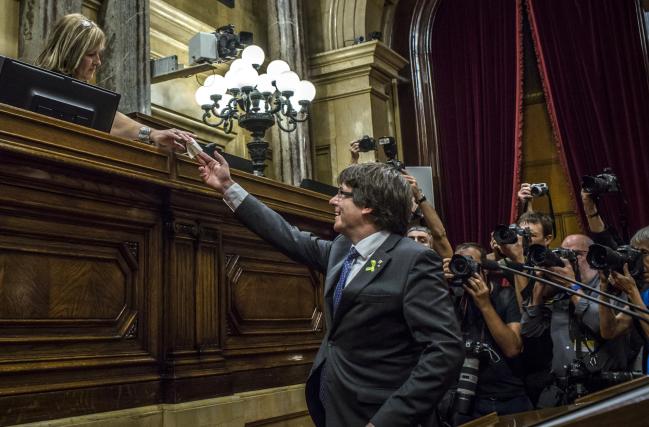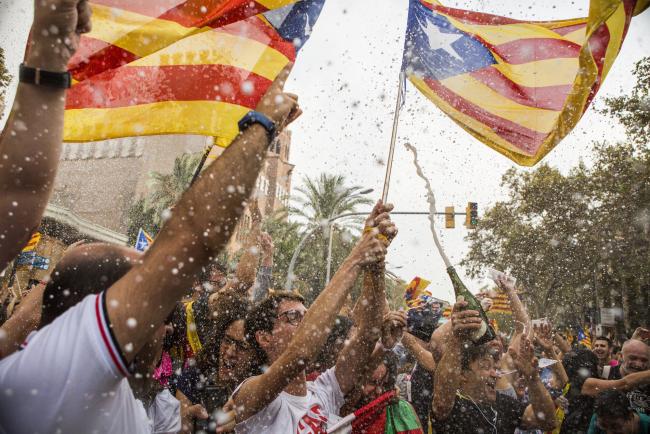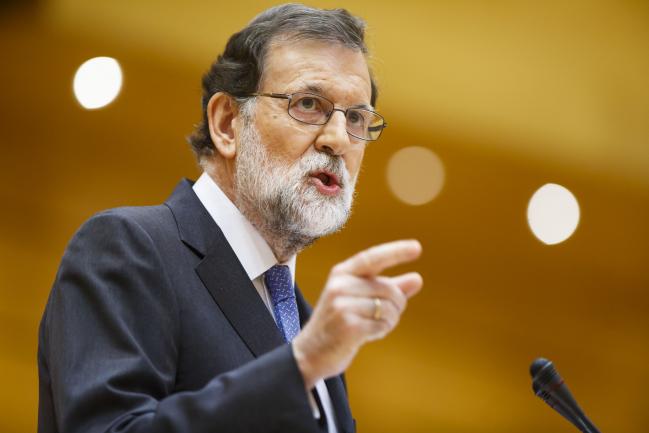(Bloomberg) -- Catalonia is headed for a dramatic confrontation with Spain after the insurgent region’s parliament voted to declare independence and the government in Madrid gained the power to oust its separatist leadership.
The resolution approved by lawmakers in Barcelona said the establishment of Europe’s newest sovereign country had been set in motion. The portion of the text submitted to a vote included measures to ask all nations and institutions to recognize the Catalan Republic.
Meanwhile in Madrid, the Spanish Senate approved measures giving Prime Minister Mariano Rajoy the power to seize control of the Catalan administration via Article 155 of the 1978 constitution.
"The Catalan Parliament has approved something that in the opinion of the great majority of people doesn’t just go against the law, but is a criminal act because it supposes declaring something that is not possible,” Rajoy said.
Catalonia’s tumultuous push for independence reached its climax with regional President Carles Puigdemont squeezed by the irreconcilable demands of his own hardliners and authorities in Madrid. In the past 48 hours, the Catalan leader sought to avoid the chaos of an illegal secession without provoking anger among his base, to no avail.
Markets Fall
Spain’s 10-year bonds dropped, with the spread against benchmark German bunds widening by seven basis points to 119 basis points. The country’s benchmark stock index, the Ibex, fell 1.4 percent, all but erasing Thursday’s gain when it looked like all-out declaration of independence might be avoided.
“We constitute the Catalan Republic, as an independent and sovereign country, under the rule of law,” Catalan parliamentary speaker Carme Forcadell read out before the secret ballot. Separatist lawmakers broke into the Catalan anthem after the vote, which was boycotted by opposition parties.
Rajoy called for calm immediately after the vote in Barcelona as crowds swelled in number in support of independence.
"The clash is here and it won’t be pretty,” Antonio Barroso, a political risk analyst at Teneo Intelligence in London, said in an email to clients. "Tensions are likely to rise significantly over the coming days, especially as secessionist groups mobilize to stop the implementation of Article 155.”
Human Shield
European Union President Donald Tusk said on Twitter that nothing has changed in the policy toward Catalonia and Spain "remains our only interlocutor." He said he hoped the Spanish government "favors force of argument, not argument of force.”
The German government also said it was behind Rajoy. Spokesman Steffen Seibert urged both sides to consider all options for dialogue and de-escalation.
Pro-independence activists had called for a human shield around government buildings to thwart Spanish efforts to take control and protect their representatives. Yesterday, they focused their ire on Puigdemont, calling him a “traitor,” as his commitment to declaring independence wavered.
Thousands flooded parliament and greeted pro-independence mayors shouting "republica" and "we’re not scared" in Catalan.
"Its been worth it, the republic is here and now our duty is to defend it from Madrid," said Guillem Jove, 22, a student who had waited since noon outside the parliament. "Rajoy will try to suppress us -- but the streets our ours."
Puigdemont had postponed declaring a republic in the aftermath of the illegal referendum on Oct. 1 that set up weeks of brinkmanship. A senior Catalan official made a last-ditch trip to Madrid on Friday in the hope of securing concessions that would help Puigdemont put a brave face on a climb down.


